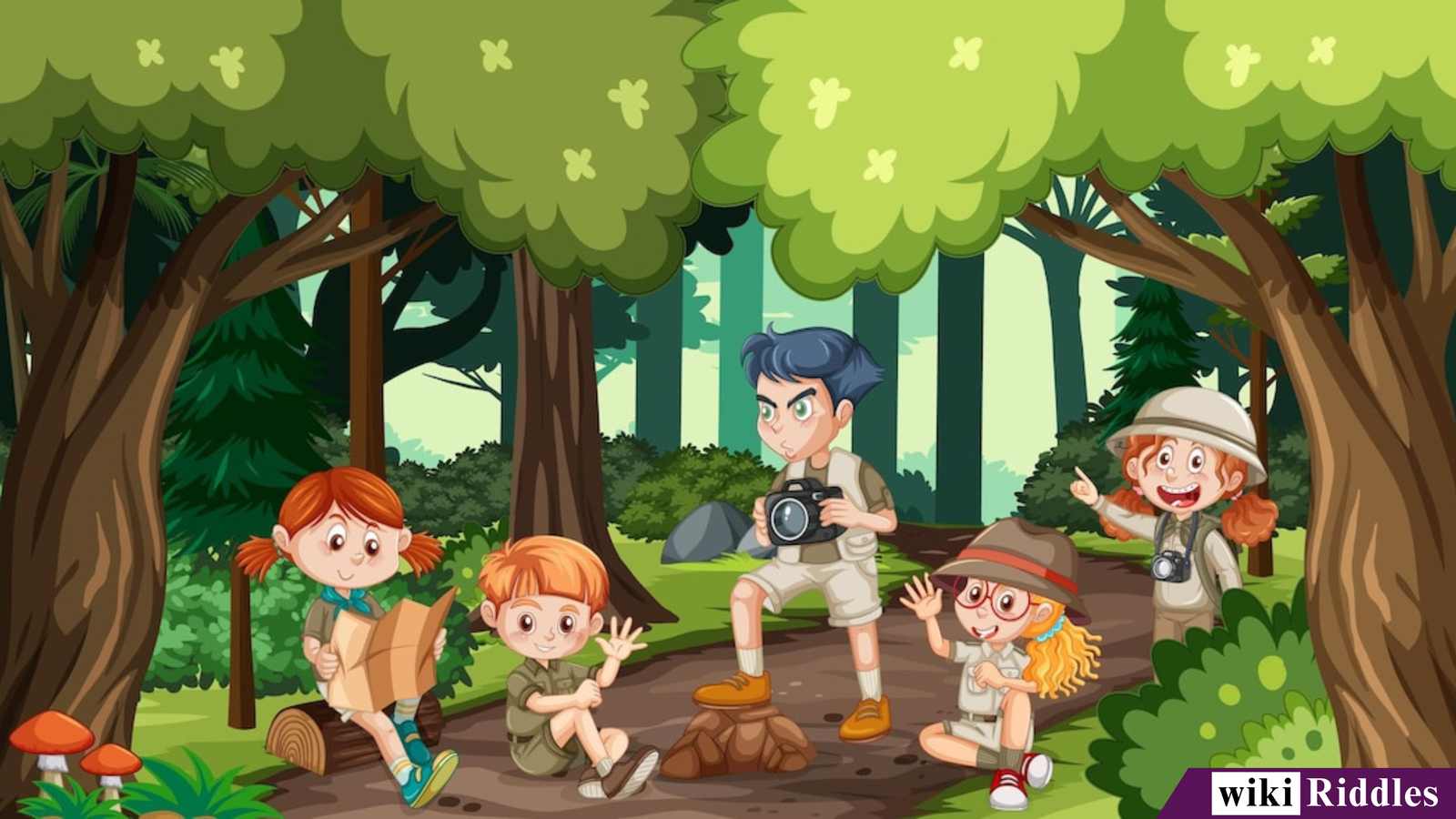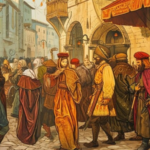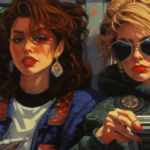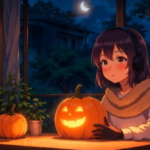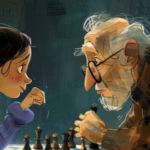We all know the classic rhyme about Jack and Jill. They went up the hill to fetch a pail of water, and then things went downhill from there. But have you ever thought about how this short little rhyme has sparked so much creativity, fun, and brain-teasing entertainment? That’s where Jack And Jill Riddles come into play.
Jack And Jill Riddles are clever twists on the familiar characters and the nursery rhyme itself. They’re not just for kids either. These riddles appeal to all ages because they mix nostalgia, humor, logic, and a touch of whimsy. Whether you’re looking to entertain children, make a classroom more engaging, or just have fun with friends, these riddles are the perfect icebreaker.
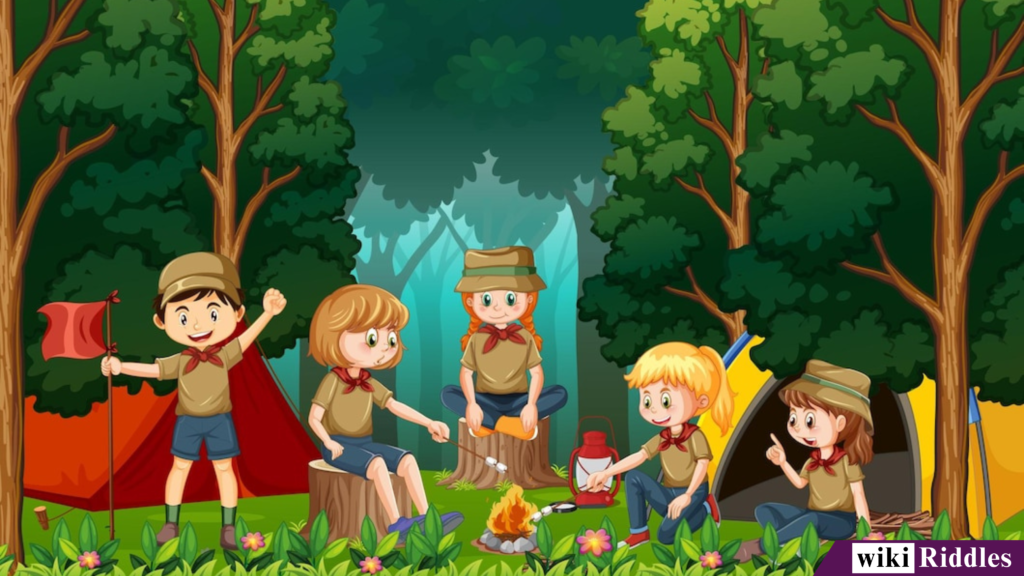
250+ “Jack And Jill Riddles” with Answers
Classic Storyline Riddles
- Riddle: Jack and Jill went up the hill, but only one came back down. Who stayed behind and why?
Answer: Jill stayed to help Jack recover from his fall. - Riddle: I was the reason they climbed so high, yet I sit quietly and never lie. What am I?
Answer: The well. - Riddle: Though I caused quite the spill, I’m not a villain, I’m just part of the hill. What am I?
Answer: The slope. - Riddle: I’m what Jack broke, yet I’m not made of gold. What part of him am I?
Answer: His crown (head). - Riddle: Though Jill followed, I led the way. I’m one half of a famous pair today. Who am I?
Answer: Jack. - Riddle: I hold the rhyme, though I never change. I’m the ending kids always exchange. What am I?
Answer: “Jack and Jill went up the hill to fetch a pail of water…” - Riddle: I’m the start of the tale, I set things in motion. Without me, there’d be no commotion. What am I?
Answer: The climb. - Riddle: I’m filled, then spilled, but never complain. What am I?
Answer: The pail. - Riddle: Though the rhyme is short, I’ve stood for years. I bring kids laughter and sometimes tears. What am I?
Answer: The nursery rhyme. - Riddle: I cause the fall, but I’m not alive. I’m part of nature, yet I make Jack dive. What am I?
Answer: Gravity.
Backstory Mysteries
- Riddle: Before the hill, they planned their task. What did they hope the water would mask?
Answer: Their thirst or household chores like cleaning or cooking. - Riddle: Who told them to go, though never mentioned in the tale?
Answer: Likely their mother or a caretaker. - Riddle: Why climb the hill when the river runs low? What secret do they know?
Answer: The well on the hill had clean, fresh water. - Riddle: What time did they leave if the sun was high and the birds were still chirping?
Answer: Likely in the late morning. - Riddle: What were they wearing that made the climb harder?
Answer: Traditional clothes like tunics or dresses, not suited for climbing. - Riddle: What were Jack and Jill’s real goal was it only water they stole?
Answer: Possibly they went for a secret adventure, not just water. - Riddle: Why didn’t they take a longer, safer path instead of climbing steep ground?
Answer: They wanted the quickest route the hill was a shortcut. - Riddle: What item did they forget that might have helped avoid the spill?
Answer: A walking stick or proper shoes. - Riddle: Who was watching them from afar, though never named?
Answer: A neighbor or a sibling, perhaps. - Riddle: What did they usually do after fetching water on normal days?
Answer: Return home for chores or rest.
Up-the-Hill Logic
- Riddle: If the hill is 30 meters tall and it takes 10 minutes to climb, how fast were they walking?
Answer: 3 meters per minute. - Riddle: They started at 2:00 PM and reached the top at 2:15 PM. How long was the climb?
Answer: 15 minutes. - Riddle: If Jack carried the pail and it slowed him down by 20%, who would reach the top first?
Answer: Jill. - Riddle: If each took one step every 2 seconds and the hill needed 100 steps, how long did it take?
Answer: 200 seconds or 3 minutes and 20 seconds. - Riddle: If Jack stumbled every 25 steps and the hill took 100 steps, how many stumbles?
Answer: 4 stumbles. - Riddle: If they took different paths Jack took the steep one and Jill took the longer but flat one who got there first?
Answer: Likely Jack, assuming no fall. - Riddle: If the sun sets at 6:30 PM and they began the climb at 6:10 PM, did they have enough light?
Answer: Just barely they likely climbed in the fading light. - Riddle: If the pail needed 5 liters and they could only carry 2.5 liters each, how many trips would it take?
Answer: One trip together, carrying it back full. - Riddle: If they slipped halfway up, how many steps did they need to redo?
Answer: Half the climb 50 steps. - Riddle: If a bird sang every 10 meters, and they heard it sing 3 times, how tall is the hill?
Answer: 30 meters.
Pail & Water Object Riddles
- Riddle: I’m made of wood or maybe tin, I hold the water they carried in. What am I?
Answer: A pail. - Riddle: I get lighter as they fill me. What am I?
Answer: The well’s rope. - Riddle: I’m dark, deep, and often round. You lower a rope to hear my sound. What am I?
Answer: A well. - Riddle: I connect Jack’s hands to the weight below. I’m strong, yet often fray with woe. What am I?
Answer: A rope. - Riddle: I’m precious, clear, and needed by all, yet I made Jack and Jill fall. What am I?
Answer: Water. - Riddle: I’m where the bucket stops. You fill me, then you drop. What am I?
Answer: The bottom of the well. - Riddle: I make the pail heavy and the hill more tricky. What am I?
Answer: Water weight. - Riddle: I’m the sound made when the pail drops into me. What sound is that?
Answer: Splash. - Riddle: Without me, the pail is dry. With me, the story makes kids cry. What am I?
Answer: The water. - Riddle: I’m the tool Jack held, though he wished he’d dropped me before the hill’s end. What am I?
Answer: The full pail.
Slips, Trips & Falls
- Riddle: I come without warning, fast and steep. I make you tumble instead of leap. What am I?
Answer: A slip. - Riddle: I’m the spot on the hill where Jack lost his step. What am I?
Answer: A loose rock. - Riddle: I’m soft when you fall, but still leave you bruised. What am I?
Answer: Grass. - Riddle: What made Jack trip, even though he looked ahead?
Answer: An unseen stone or patch of mud. - Riddle: I follow your step, but lead to your fall. What am I?
Answer: A misstep. - Riddle: If the slope was too steep and shoes were too slick, what caused the fall?
Answer: A lack of grip or traction. - Riddle: What did Jill see before she fell?
Answer: Jack tumbling down. - Riddle: What could’ve saved them both from the fall?
Answer: A handrail or rope guide. - Riddle: I’m the bump before the crash. What am I?
Answer: A stumble. - Riddle: Though Jack was first, I came second but still fell. Who am I?
Answer: Jill.
Broken Crown Conundrums
- Riddle: I sit on your head, yet I’m not a king’s. What am I?
Answer: Your crown (head). - Riddle: Jack broke me, but needed me most. What am I?
Answer: His skull (crown). - Riddle: What does “crown” really mean in the rhyme?
Answer: The top of the head. - Riddle: What did Jill use to wrap Jack’s crown?
Answer: A bandage or cloth. - Riddle: If Jack had worn me, his crown would be fine. What am I?
Answer: A helmet. - Riddle: What sound followed Jack’s fall?
Answer: A thud or crack. - Riddle: Who helped Jack after his crown cracked?
Answer: Jill. - Riddle: What bone may have been bruised in the tale?
Answer: The skull. - Riddle: I’m what you use when someone’s hurt. What am I?
Answer: A first aid kit. - Riddle: What might the doctor have said about Jack?
Answer: He has a concussion or needs rest.
Time & Sequence
- Riddle: What came first the pail or the fall?
Answer: The pail was filled before the fall. - Riddle: Did Jill fall because Jack did, or was it her own slip?
Answer: She followed Jack and fell too. - Riddle: What happened after the fall?
Answer: Jack was bandaged and helped home. - Riddle: What came before the climb?
Answer: The decision to fetch water. - Riddle: Was the water ever brought home?
Answer: No, it was likely spilled in the fall. - Riddle: When did Jack and Jill leave the house?
Answer: Earlier in the day, likely morning or noon. - Riddle: How long did the entire event take?
Answer: Possibly less than an hour. - Riddle: Was the fall immediate after the pail was filled?
Answer: Yes, it happened soon after. - Riddle: What was the last action in the rhyme?
Answer: Jill coming tumbling after. - Riddle: When did the rhyme likely take place morning or evening?
Answer: Morning or early afternoon.
Direction & Distance
- Riddle: Which direction did Jack and Jill climb?
Answer: Likely uphill to the north or east, depending on sun position. - Riddle: How far was the hill from home if it took 15 minutes to reach?
Answer: About 1 kilometer on foot. - Riddle: If they took 100 steps uphill, how far is each step on average?
Answer: Around 0.75 meters. - Riddle: What’s higher the well or the house?
Answer: The well, since it’s at the top of the hill. - Riddle: After the fall, in which direction did Jack roll?
Answer: Downhill, back toward home. - Riddle: What path did Jill take compared to Jack?
Answer: The same path, just moments behind. - Riddle: Was the hill steep or gradual?
Answer: Likely steep, since they tumbled. - Riddle: How many paces would it take to reach the well again?
Answer: The same as the climb around 100 steps. - Riddle: Which direction would the water flow from the hilltop?
Answer: Downhill in all directions. - Riddle: If they dropped the pail midway down, where would it land?
Answer: Near the base of the hill, depending on momentum.
Who/What/Where Whodunits
- Riddle: Someone moved the rock that made Jack fall. Who might the culprit be?
Answer: A prankster from the village or even a mischievous goat. - Riddle: What item vanished after the tumble and was never found?
Answer: The pail. - Riddle: Who saw Jack and Jill fall but said nothing?
Answer: Possibly a bird or squirrel on the hill. - Riddle: What was at the top of the hill before they arrived?
Answer: The old well. - Riddle: Who helped Jack after his fall, besides Jill?
Answer: A nearby farmer or villager might have helped carry him. - Riddle: What made the path extra slippery that day?
Answer: Morning dew or a recent rain. - Riddle: Who fixed the broken crown in the end?
Answer: A village doctor or Jill herself with a cloth wrap. - Riddle: Where did they plan their hill trip?
Answer: Likely at their home, in the kitchen or near the fire. - Riddle: What was missing from their journey that could’ve prevented the fall?
Answer: A walking stick or proper shoes. - Riddle: Who was blamed for the accident in the village tale?
Answer: Jack, for rushing ahead too quickly.
Pun & Wordplay
- Riddle: Why did Jack take a break halfway up the hill? He needed a little well-ness.
Answer: Because he wanted a rest and a drink from the well. - Riddle: What’s Jill’s favorite type of water? Still water not the kind that makes her fall.
Answer: A pun on “still” vs. “spill.” - Riddle: What did Jack say after tumbling down? “Well, that didn’t go down well.”
Answer: A pun on falling and disappointment. - Riddle: What’s Jack’s favorite band? Fall Out Boy.
Answer: Wordplay on the fall. - Riddle: Why do Jack and Jill never win races? They always take a spill.
Answer: A pun on falling and racing. - Riddle: What did Jill say at the bottom of the hill? “That was hill-arious.“
Answer: A pun on “hill” and “hilarious.” - Riddle: What’s a water-fetching duo’s favorite dance? The pail-sa.
Answer: A pun on “pail” and “salsa.” - Riddle: What did Jack say when he broke his crown? “Head’s up!”
Answer: Wordplay on warning and his injury. - Riddle: What’s the hill’s favorite genre? Slapstick.
Answer: Because of all the falling. - Riddle: What’s Jack’s least favorite month? Fall.
Answer: Pun on both the season and tumbling.
Homophones & Double Meanings
- Riddle: I’m what Jack fetched but also how you feel when you miss someone. What am I?
Answer: A pail (pale). - Riddle: I’m the well that gives water and the well that means good health. What am I?
Answer: Well. - Riddle: Jack wore me on his crown but wasn’t royalty. What am I?
Answer: His head (crown). - Riddle: Jill went down the hill and felt down afterward. What does down mean here?
Answer: Direction and emotion. - Riddle: Jack was falling for Jill literally. What am I?
Answer: A pun and homonym for love and physical falling. - Riddle: I’m a trip you take and also what causes a fall. What am I?
Answer: A trip. - Riddle: Jill had slipped, and now she’s feeling slipped. Explain.
Answer: Physical slip and feeling embarrassed. - Riddle: What’s still but can also move fast downhill?
Answer: Water. - Riddle: Jack’s crown cracked did it mean a head injury or lost authority?
Answer: It means both metaphorically and literally. - Riddle: They fell into trouble, but did they fall into anything else?
Answer: They also physically fell.
Hidden-Word/Acrostic
- Riddle: Look closely: “Just A Curious Kid” hides someone’s name. Who is it?
Answer: JACK. - Riddle: “Journey In Little Lands” hides someone’s identity. Who?
Answer: JILL. - Riddle: Which word in “They ran up the hill to get water” contains a hidden object?
Answer: “water” contains “ate,” a clue to thirst. - Riddle: Find the tool hidden in “Slippery Path Always Leads Elsewhere.”
Answer: PALE (pail). - Riddle: “Witty Every Little Laugh” hides a location. What is it?
Answer: WELL. - Riddle: What hill hides a crown?
Answer: The word “brownhill” contains “brow,” a crown synonym. - Riddle: “Going Over Water, Ever Rising” what’s the hidden place?
Answer: GOWER (a stretch of high land). - Riddle: The clue “Rocky Underpass Shifts Heavily” spells what?
Answer: RUSH. - Riddle: “Winds Each Light Leap” hides what object?
Answer: WELL. - Riddle: “Fall Over Rapid Landscape” reveals what word?
Answer: FALL.
Anagrams & Scrambles
- Riddle: Unscramble “KJAC” to find the boy who went up the hill.
Answer: JACK. - Riddle: Rearrange “LJIL” to get the girl who came tumbling after.
Answer: JILL. - Riddle: Unscramble “LEPA” to carry water.
Answer: PAIL. - Riddle: What does “TWARE” hold when unsorted?
Answer: WATER. - Riddle: Mix “CREWON” to find a tool for the fall.
Answer: CROWN. - Riddle: Rearranged, “WELLO” makes something deep.
Answer: WELL. - Riddle: What does “GHRATVIY” become when solved?
Answer: GRAVITY. - Riddle: Unscramble “SHOLFE” it holds things in place.
Answer: SLOPE. - Riddle: “MUPLBE” shakes and rolls. What is it?
Answer: TUMBLE. - Riddle: Rearranged, “STPIE” means you fell.
Answer: SPITE (close), or better: SLIP from another set.
Rebus & Visual-Word
- Riddle: Picture a crown above a cracked egg what happened?
Answer: Jack broke his crown. - Riddle: An arrow going up a hill + a pail = ?
Answer: Jack and Jill fetching water. - Riddle: Water + hill + cracked head emoji = ?
Answer: The Jack and Jill story. - Riddle: 👦➡️⛰️💧➡️💥😵 = ?
Answer: Jack went up the hill, fetched water, then fell. - Riddle: A pail + X over it = ?
Answer: Spilled water. - Riddle: Crown emoji + break symbol = ?
Answer: Broken crown. - Riddle: 🪣 + ⛰️ + 😱 + ➡️🏡 = ?
Answer: The journey up and fall down. - Riddle: Well + hill = ?
Answer: The top of the hill with a water source. - Riddle: 🙎♂️💦🏃♂️⛷️ = ?
Answer: Jack fetched water and fell down. - Riddle: Water + 👣 + gravity symbol = ?
Answer: Slipping downhill.
Math-on-the-Hill
- Riddle: If Jack takes 60 steps to climb the hill and each step is 0.5 meters, how far did he go?
Answer: 30 meters. - Riddle: The pail weighs 2 kg empty and 7 kg full. How much water did it hold?
Answer: 5 kg of water. - Riddle: If Jack falls at a speed of 2 meters per second for 4 seconds, how far did he tumble?
Answer: 8 meters. - Riddle: Jill is 3 meters behind Jack. If she runs 1 meter faster, how long to catch up?
Answer: 3 seconds. - Riddle: If the hill angle is 30 degrees and Jack slips 10 meters, how high was he?
Answer: About 5 meters vertically. - Riddle: They fetch water once a day. In a week, how many trips?
Answer: 7 trips. - Riddle: Each trip takes 15 minutes. How long do they spend fetching water in 4 days?
Answer: 1 hour (15 x 4). - Riddle: If the well holds 100 liters and the pail carries 5, how many full pails to empty it?
Answer: 20 pails. - Riddle: Jack climbs at 1.5 km/h. How long to climb a 0.75 km hill?
Answer: 30 minutes. - Riddle: If Jill slips 25% of the hill’s height, and it’s 20 meters tall, how far did she fall?
Answer: 5 meters.
Science of Spills
- Riddle: What natural force pulled Jack to the ground?
Answer: Gravity. - Riddle: What made the hill slippery in the morning?
Answer: Dew or condensation. - Riddle: Why does water make things slippery?
Answer: It reduces friction between surfaces. - Riddle: Why did the full pail make falling worse?
Answer: It added weight and threw off balance. - Riddle: What causes people to tumble when running downhill?
Answer: Momentum and uneven footing. - Riddle: Why does a hill increase fall speed?
Answer: Gravity accelerates you on a slope. - Riddle: What might protect against head injury during a fall?
Answer: A helmet or cushion. - Riddle: What kind of energy increases during the fall?
Answer: Kinetic energy. - Riddle: How does angle of slope affect fall risk?
Answer: Steeper angles increase risk. - Riddle: Why did water spill as they fell?
Answer: Sudden movement and loss of control.
Nursery Rhyme Mashups
- Riddle: Jack met a girl with a little lamb on the way up. Who was she?
Answer: Mary. - Riddle: Jill tripped over something Miss Muffet dropped. What was it?
Answer: Her curds and whey. - Riddle: Who did Jack see falling before him, holding a trumpet?
Answer: The cow that jumped over the moon. - Riddle: What spider scared Jill back down the hill?
Answer: The one from “Little Miss Muffet.” - Riddle: Who helped Jack and Jill clean up after the spill?
Answer: The dish and the spoon. - Riddle: Jack saw someone tumbling before him from a wall. Who was it?
Answer: Humpty Dumpty. - Riddle: Who fetched water before Jack and Jill but lost their shoe?
Answer: The old woman who lived in a shoe. - Riddle: Who brought a fiddle to the hilltop dance?
Answer: The cat from “Hey Diddle Diddle.” - Riddle: Who warned Jack not to go but he didn’t listen?
Answer: Mother Goose. - Riddle: Who kissed Jill on the hill and ran off?
Answer: Georgie Porgie.
Role Reversal & What-Ifs
- Riddle: What if Jill went up the hill first who would’ve fallen?
Answer: Possibly Jack, still following behind and slipping too. - Riddle: What if they fetched juice instead of water would the rhyme still work?
Answer: No, the rhyme would be off and the story would be strange. - Riddle: If Jack stayed at home and Jill went alone, who would’ve fetched the pail?
Answer: Jill. - Riddle: What if the hill had stairs instead would they have fallen?
Answer: Less likely stairs are safer. - Riddle: If Jill had carried the pail, what might have changed?
Answer: Jack might have been less burdened and avoided falling. - Riddle: What if they used a drone to fetch water?
Answer: They wouldn’t need to climb at all. - Riddle: What if Jack caught Jill during her fall?
Answer: Both may have landed more safely. - Riddle: What if it was night instead of day?
Answer: The darkness could have caused more danger. - Riddle: If the pail was empty on the way down, would the fall be easier?
Answer: Yes, it would be lighter to carry. - Riddle: What if they never went up the hill at all?
Answer: No rhyme, no fall, no story to tell.
Modern Makeover
- Riddle: What would Jack and Jill use instead of a pail today?
Answer: A reusable water bottle. - Riddle: What gadget would they use to avoid falling?
Answer: A smartwatch with GPS and fall detection. - Riddle: What if there was a tap at the bottom of the hill?
Answer: No need to climb safer and simpler. - Riddle: What modern transport would they take up the hill?
Answer: An electric scooter or bike. - Riddle: What app would they use to find the best water source?
Answer: Google Maps or a water quality tracker. - Riddle: What would Jack post on social media after the fall?
Answer: “Took a tumble today. #HikingFails” - Riddle: If Jill had a smartphone, what would she do first after the fall?
Answer: Call for help or record a TikTok. - Riddle: What modern safety gear would prevent Jack’s crown break?
Answer: A bike helmet. - Riddle: What message might their smartwatch send during the fall?
Answer: “Hard fall detected. Emergency services contacted.” - Riddle: What would Alexa say if it heard the fall?
Answer: “It sounds like someone fell. Should I call for help?”
Alternate Endings
- Riddle: What if Jack tripped but Jill caught him?
Answer: They might’ve stayed upright no injury, no fall. - Riddle: What if they both sat and rested before coming down?
Answer: They might’ve avoided the accident. - Riddle: What if a bird warned them about the slippery slope?
Answer: They may have taken a safer route. - Riddle: What if Jack only dropped the pail but stayed standing?
Answer: The water would be lost, but not his crown. - Riddle: What if the rhyme ended with them laughing instead?
Answer: It would be a funny tale instead of a cautionary one. - Riddle: What if Jill had never fallen, would she have helped Jack?
Answer: Yes, she would’ve helped him back up. - Riddle: What if Jack rolled into a patch of flowers instead of rocks?
Answer: A softer landing and maybe a sweeter ending. - Riddle: What if the rhyme was about getting up, not falling down?
Answer: It would be more uplifting a story of resilience. - Riddle: What if they fetched something other than water?
Answer: The rhyme would change maybe they’d fetch hope or joy. - Riddle: What if Jack broke nothing but his pride?
Answer: A lesson in humility, not injury.
Moral & Lesson
- Riddle: What’s the lesson in their fall?
Answer: Always be careful and take your time. - Riddle: Why is teamwork important in the rhyme?
Answer: Jack and Jill went together and faced the consequences together. - Riddle: What can we learn about planning from the story?
Answer: Think ahead, especially when climbing slippery hills. - Riddle: What does the story teach about rushing?
Answer: Going too fast can lead to a fall. - Riddle: What does the rhyme say about safety?
Answer: It matters one misstep can change everything. - Riddle: Why does the rhyme focus on a broken crown?
Answer: To show the seriousness of carelessness. - Riddle: What virtue does Jill show?
Answer: Loyalty and care she follows Jack and likely helps him. - Riddle: What can kids learn from Jack’s mistake?
Answer: Be cautious and don’t rush into things. - Riddle: What deeper meaning can be found in the climb?
Answer: Every goal has risks prepare wisely. - Riddle: Why is the story still told today?
Answer: Its lesson is timeless think before you act.
Rhyme & Meter
- Riddle: What rhymes with Jill and climbs a hill?
Answer: A quill (or “will” in poetic tone). - Riddle: What meter is the line “Jack and Jill went up the hill”?
Answer: It’s in trochaic meter stressed then unstressed syllables. - Riddle: What’s the rhyme scheme of the first stanza?
Answer: AABB. - Riddle: What’s a rhyming word for crown that suits the rhyme?
Answer: Down. - Riddle: What line rhymes with “to fetch a pail of water”?
Answer: “Jack fell down and broke his crown.” - Riddle: What line in the rhyme uses internal rhyme?
Answer: “Jack fell down and broke his crown.” - Riddle: If you change the last word in “Jack fell down and broke his crown,” what must the next line end with?
Answer: A word that rhymes with the new word to keep the flow. - Riddle: What’s the effect of rhythm in nursery rhymes?
Answer: It makes them memorable and musical. - Riddle: Can the rhyme be sung to a melody?
Answer: Yes it has a song-like structure. - Riddle: What poetic device is used in “tumbling after”?
Answer: Alliteration and imagery.
Broken Crown Casefile
- Riddle: Where exactly was Jack’s crown injured?
Answer: Likely the top or side of his head. - Riddle: What object might have caused the damage?
Answer: A rock or a tree root. - Riddle: Was Jack unconscious after the fall?
Answer: Possibly he needed help and rest. - Riddle: What treatment did Jack receive?
Answer: A bandage and some rest at home. - Riddle: Did the crown injury require stitches?
Answer: Maybe depends how bad the crack was. - Riddle: Could Jack have avoided the injury?
Answer: Yes by moving slowly or using safety gear. - Riddle: Who tended to his wound?
Answer: Jill or a local doctor. - Riddle: Was the crown break visible?
Answer: Likely yes a bump or blood may have shown. - Riddle: Did Jack fully recover?
Answer: According to the rhyme, yes he got back up. - Riddle: What lasting effect did the injury have?
Answer: Possibly caution he may not run up hills again.
Cultural/Regional Variants
- Riddle: If Jack and Jill lived in the desert, what would they fetch?
Answer: Water from a distant well or oasis. - Riddle: In a snowy land, what might cause their fall?
Answer: Ice and slippery snow. - Riddle: In a city version, where would Jack and Jill go?
Answer: Up an elevator to a rooftop water tank. - Riddle: In a tropical region, what replaces the hill?
Answer: A steep path through a jungle or banana grove. - Riddle: In an island culture, what tool replaces the pail?
Answer: A clay jug or coconut shell. - Riddle: What would they wear in cold climates during the climb?
Answer: Boots, scarves, and coats. - Riddle: What causes a fall in a rainy region?
Answer: Mud or moss-covered stones. - Riddle: What water source replaces the well in a coastal village?
Answer: A freshwater spring or a collected rainwater tank. - Riddle: What rhyme would fit if they fetched rice instead of water?
Answer: “Jack and Jill went up the hill to gather grains so fine…” - Riddle: In a flat region, how would the story change?
Answer: They might walk to a far-off pump instead of climbing.
Meta & Fourth-Wall
- Riddle: Why are you still reading about Jack and Jill?
Answer: Because the rhyme keeps you curious. - Riddle: Who’s really telling the story of Jack and Jill?
Answer: You are every time you say the rhyme. - Riddle: What happens when you question the rhyme’s logic?
Answer: You start writing your own version. - Riddle: What if Jack and Jill knew they were part of a rhyme?
Answer: They might’ve climbed more carefully. - Riddle: Who decided Jack had to fall?
Answer: The storyteller or poet. - Riddle: If Jill could talk to the reader, what would she say?
Answer: “Why didn’t you warn me he’d fall?” - Riddle: Who broke the fourth wall first Jack or Jill?
Answer: Probably Jack when he shouted mid-tumble. - Riddle: What’s the real reason this rhyme exists?
Answer: To teach through rhythm and story. - Riddle: Who’s more important the reader or the rhyme?
Answer: They need each other one tells, the other listens. - Riddle: What happens when you reach the end of the rhyme?
Answer: You go back to the top again and again.
Why Riddles Capture Our Imagination
Riddles have been entertaining people for generations. From ancient Greek scholars to modern-day kids on playgrounds, riddles tap into something universal. They challenge the mind, but in a playful way. You don’t need a degree to enjoy a riddle. All you need is curiosity and a sense of humor.
The beauty of riddles lies in how they bend logic and language. They present a problem that sounds simple, but the solution often requires a shift in thinking. That little spark of realization when the answer clicks is addictive. It’s like solving a mini-mystery, and who doesn’t love a good mystery?
The Timeless Appeal of Jack and Jill
Jack and Jill are among the most recognizable names from nursery rhymes. Their story is short, simple, and memorable. Because everyone knows the original rhyme, it’s easy to play with the characters and story in riddle form. This familiarity is what makes Jack And Jill Riddles so effective and fun. The audience already has a mental image, so when you twist the context, the punchline hits harder.
Plus, the story has action, misfortune, and a pair of lovable characters. All of these elements are ripe for riddles. You can explore endless scenarios, from silly to smart, all while staying within the theme.
The Origin of Jack And Jill
- A Quick Peek Into the Nursery Rhyme
Here’s the original rhyme that most of us grew up with:
Jack and Jill went up the hill
To fetch a pail of water
Jack fell down and broke his crown
And Jill came tumbling after
It’s short, dramatic, and oddly memorable. The imagery of two children climbing a hill and falling is simple but powerful. And that’s exactly why it sticks in our heads and makes such a good setup for riddles.
- Historical Interpretations and Hidden Meanings
Believe it or not, some historians believe this rhyme might have political or historical roots. One theory is that it’s about King Louis XVI and Queen Marie Antoinette losing their “crowns” during the French Revolution. Others say it refers to taxation laws during King Charles I’s reign. There’s even a Scandinavian myth about two children sent to fetch water who never returned.
But for most people today, it’s just a cute, slightly tragic rhyme. Whether or not it has deeper meaning, it provides the perfect foundation for riddles because it’s both familiar and slightly mysterious.
What Makes Jack And Jill Riddles Unique
- Combining Humor, Wit, and Wordplay
These riddles take what you already know and flip it on its head. They often rely on puns, clever twists, or playful misdirection. Because the rhyme is so well known, it gives you room to be creative with the storyline while still keeping it recognizable.
For example, a riddle might suggest that Jack is now in therapy for his fall, or that Jill sued him for damages. The humor comes from placing the familiar characters into outrageous or modern situations.
- Familiar Characters in Unexpected Scenarios
Jack and Jill don’t just live in a rhyme anymore. In riddles, they become detectives, astronauts, inventors, or even stand-up comedians. This flexibility makes the riddles more engaging and entertaining. You can imagine them doing almost anything, which opens the door to all sorts of clever scenarios.
Classic Jack And Jill Riddles
Classic riddles are perfect for young children or anyone just starting to enjoy riddles. They often stick closely to the original rhyme but with a small twist to keep things interesting.
Riddle: Why did Jack and Jill bring a camera up the hill?
Answer: To capture the moment before everything went downhill.
Riddle: What did Jill say after Jack fell?
Answer: I told you to watch your step!
Riddle: Why was the hill so popular?
Answer: Because Jack and Jill made it famous.
These types of riddles are easy to remember and fun to share with kids during storytime or playtime.
Challenging Jack And Jill Riddles
If you’re looking for something a bit more brainy, challenging riddles are where it’s at. These are great for older kids, teens, or adults who enjoy thinking outside the box.
Riddle: Jack and Jill both climbed the same hill, but only Jack came back. Why?
Answer: Jill opened a lemonade stand at the top and stayed for business.
Riddle: Jill fell faster than Jack, yet landed after him. How?
Answer: Because she took a longer route with more bounce.
Riddle: Jack broke his crown. What did Jill break?
Answer: The record for fastest downhill tumble.
These riddles test logic, language, and sometimes even a little math or science. They’re excellent for classroom activities or competitive games.
Funny Jack And Jill Riddles
Humor is a huge part of why people love riddles, and Jack And Jill Riddles are no exception. These jokes often involve puns or ridiculous situations that take the rhyme in hilarious new directions.
Riddle: Why did Jack bring a GPS?
Answer: Because last time he fell off course.
Riddle: What did Jill do when Jack broke his crown?
Answer: She crowned herself Queen of the Hill.
Riddle: What’s Jack’s favorite type of music?
Answer: Hip-hop. It helps with all that falling.
These riddles are perfect for parties, classrooms, or anywhere you need a quick laugh.
Educational Benefits of Solving Riddles
- Boosting Critical Thinking Skills
Riddles teach you how to pause, evaluate, and analyze information. They encourage you to look at things from different perspectives. This is a crucial skill not just in school, but in everyday life. The more riddles you solve, the sharper your mind becomes.
- Encouraging Creative Problem Solving
Solving a riddle is like unlocking a tiny treasure chest. You try different mental keys until one fits. This kind of creative problem solving helps build resilience and confidence, especially in kids.
How to Create Your Own Jack And Jill Riddles
- Understanding the Riddle Format
A basic riddle has a setup and a punchline. The setup introduces the situation, often pulling from the original nursery rhyme. The punchline is where you flip expectations and deliver the twist.
Example:
Riddle: Why did Jack wear goggles up the hill?
Answer: To protect his eyes from the plot twist.
- Tips for Making Them Engaging and Fun
Start with a simple idea. Think of a funny or clever question involving Jack or Jill. Add a twist, pun, or surprise. Keep it short and punchy. Rhyming isn’t required, but it can make your riddle more memorable.
You can even involve kids in the process. Ask them to come up with their own scenarios. It’s a great way to build storytelling and writing skills.
Riddles for the Classroom or Family Game Night
- Ice-Breakers with a Rhyming Twist
Start a class or event with a simple riddle. Ask the group to guess the answer. It’s an easy way to get people thinking and talking. You can even give small prizes for correct answers.
- Group Riddle Games for All Ages
Try a Riddle Circle where everyone shares their favorite Jack And Jill Riddle. Or do a Create Your Own challenge where teams invent riddles and compete for the best one. These games are fun, interactive, and educational.
Jack And Jill in Modern Pop Culture
- Parodies and Comic Adaptations
From animated films to comedy skits, the classic rhyme has been parodied countless times. These adaptations often take the familiar story and put it in an absurd or modern setting.
- Riddles Inspired by Modern Takes
You might find a riddle where Jack and Jill are influencers climbing the hill to record a vlog. Or maybe they’re gamers trying to beat the Water Bucket Level. The possibilities are endless when you mix tradition with pop culture.
How Riddles Help with Language Development
- Enhancing Vocabulary in Children
Riddles introduce new words and ideas in a fun, digestible way. Kids are more likely to remember a word when it’s tied to a funny or clever riddle.
- Supporting Storytelling and Imagination
Writing and solving riddles helps children learn how stories are structured. They begin to understand how setups and punchlines work, which builds narrative skills and boosts imagination.
Jack And Jill Riddles for Social Media
- Riddles That Go Viral
A clever riddle with a surprising answer can get tons of likes and shares. People love content that makes them think and smile at the same time.
- Engaging Your Audience with Clever Content
You can post a daily riddle and ask your followers to guess the answer in the comments. It’s a fun way to build engagement and keep your audience coming back for more.
Seasonal Jack And Jill Riddles
- Holiday-Themed Riddles
Riddle: What did Jack and Jill bring up the hill at Christmas?
Answer: A sleigh full of snowballs.
- Back-to-School and Summer Fun Ideas
Riddle: Why did Jill carry a backpack instead of a bucket?
Answer: Because it’s the first day of school and she’s ready to learn.
Tips for Solving Tough Riddles
- Think Outside the Bucket
Don’t get stuck thinking literally. Riddles often rely on wordplay, puns, and figurative language. If something feels too obvious, it probably isn’t the real answer.
- Breaking Down the Clues
Pay attention to every word. Is there a double meaning? Does it reference something familiar? Are there any rhymes or puns hiding in plain sight? With practice, you’ll start spotting the answers more quickly.
Conclusion
We hope you had a blast solving these 250+ smart “Jack and Jill riddles”! Whether you were playing along with family, challenging friends, or simply testing your brainpower, these riddles bring a timeless nursery rhyme to life in a fun and engaging way. If you enjoyed these, don’t miss our special collection of 250+ “Rhyming Riddles” with Answers – Try to Solve for even more clever wordplay and poetic puzzles. Keep challenging yourself and happy riddle-solving!
FAQs
Q. What are Jack And Jill Riddles?
They are riddles inspired by the classic nursery rhyme, often using clever twists, puns, or humorous logic.
Q. Are these riddles suitable for all ages?
Yes. There are easy versions for young children and more challenging or funny ones for teens and adults.
Q. Can I create my own Jack And Jill Riddles?
Absolutely. All you need is a creative idea and a playful sense of humor.
Q. Why are these riddles so popular?
Because they mix a familiar story with fun surprises, making them entertaining for everyone.
Q. Where can I find more riddles like this?
You can find them in children’s books, educational websites, and social media, or you can create your own collection for personal or classroom use.
